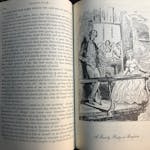Why do we listen to songs that remind us of lost friends and lovers? Why do we love to hear stories of family members who have died? In "The Big Book of the Dead," Marion Winik argues that we find comfort there, a point she makes in her introduction to these 125 remembrances that memorialize those she has lost.
She writes: "Part of the beauty of the song, like so many other songs of mourning, is that people hear and feel in it a reflection of their own grief. … It takes away some of the brutal loneliness of bereavement to hear those lyrics, or to read that story, to see the monument someone else has made by hand. To join a chain of remembering. It does not make us any sadder to consume these morbid entertainments; it may even ease our hearts."
Winik had previously published "The Baltimore Book of the Dead" and "The Glen Rock Book of the Dead." The texts of each are included here, but they have been combined and placed in chronological order. Winik has also written new tributes that appear in print for the first time.
The image that suffused my reading was one of stringing pearls. Each pearl is gorgeous and luminescent. Combined onto a necklace, pearls transfer that luminescence to human flesh. So do Winik's pieces. Each of them seemed to me better than the one previous to it, and I continued reading even as I wiped away tears. These are not eulogies. Funeral eulogies tend to focus solely on the praiseworthy elements of a life, but the things that make us unique, truly human, are more often our foibles, the mistakes we've made and learned from, and the ways we make atonement to those we have hurt.
Grief is for those left behind, and Winik writes of it in all of its stages. About losing her mother, she writes, "Imagine Persephone coming up from hell and Demeter not there. Strange cars in the driveway, the rose bushes skeletons. You stand there at first, uncomprehending, your poem in your hand. Then you go somewhere, call it home. Call it spring."
Few are mentioned by their names; instead, they are described as "the Golf Pro," or "the Big Sister," or "the Mensch." Because the entries are in chronological order, the beginning essays are crowded with those Winik knew as a child, or friends of one of her parents.
The Torah teaches that one is obligated to "care for the stranger." In these eloquent praise songs for those who have died, some of Winik's most poignant pieces are about people she never had the opportunity to meet. Minneapolis folks will recognize "The Artist," who she saw three times in concert. At the last of these, "a concert for peace on Mother's Day," she writes: "Ten thousand voices singing You, I would die for you, and it felt like something good could happen in this maddened city. I was bent over, sobbing. Mom, said my daughter. Watch the show."
Regardless of the proximity of her relation to Winik's subjects, each of these pieces is written with gorgeous turns of phrase and her recognition of the quiet dignity of their lives.
Lorraine Berry is a writer in Florida.
The Big Book of the Dead
By: Marion Winik.
Publisher: Counterpoint, 292 pages, $16.95.






